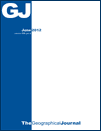
GEOGRAPHICAL JOURNAL
Scope & Guideline
Pioneering research that shapes our understanding of the planet.
Introduction
Aims and Scopes
- Interdisciplinary Research:
The journal promotes interdisciplinary studies, integrating insights from sociology, environmental science, economics, and political science to address geographical phenomena. - Spatial Analysis and Mapping:
Utilizing advanced spatial analysis techniques and mapping tools, the journal examines how geographical factors influence social, political, and economic outcomes. - Focus on Environmental Justice:
A consistent theme is the exploration of environmental justice, with research addressing the disparities in environmental impacts across different communities. - Urban and Rural Dynamics:
The journal investigates trends in urbanization and rural development, including issues of migration, housing, and community resilience. - Cultural and Political Geographies:
Research often delves into the cultural and political dimensions of geography, including the impacts of colonialism, nationalism, and globalization on spatial practices. - Climate Change and Sustainability:
The journal emphasizes the importance of studying climate change effects and sustainable practices within various geographical contexts.
Trending and Emerging
- Climate Justice and Resilience:
A growing body of work is dedicated to climate justice, emphasizing equitable responses to climate change and the resilience of marginalized communities. - Technological Integration in Geography:
The integration of technology, such as AI and big data, into geographical research is increasingly prominent, focusing on urban analytics, environmental monitoring, and participatory mapping. - Migration and Mobility Studies:
Research on migration patterns, including the experiences of refugees and economic migrants, is on the rise, reflecting global migration crises and their geographical implications. - Health Geography:
There is a notable increase in health-related geographical studies, particularly in the context of pandemics and public health responses that highlight spatial inequalities. - Decolonial and Indigenous Perspectives:
Emerging themes focus on decolonial approaches and indigenous knowledge systems, addressing historical injustices and advocating for inclusive geographical narratives. - Urban Commons and Community-Led Initiatives:
Research on urban commons and community-led initiatives is gaining attention, exploring alternative governance models and participatory practices in urban settings.
Declining or Waning
- Traditional Economic Geography:
There is a waning focus on traditional economic geography topics, such as classical trade theories and static economic models, as research increasingly favors dynamic and interdisciplinary approaches. - Historical Geography:
The exploration of purely historical geographical studies appears to be declining, with a shift towards contemporary issues and their spatial implications overshadowing long-term historical analyses. - Land Use Planning:
Research specifically dedicated to conventional land use planning has decreased, as the journal's emphasis shifts towards more innovative and participatory planning approaches. - Globalization Studies:
While globalization remains relevant, the specific focus on its impacts has diminished, with more attention being given to localized studies and grassroots movements. - Rural Geography:
The focus on rural geography as a standalone theme has decreased, as many studies incorporate rural contexts into broader urbanization and migration narratives.
Similar Journals

Hrvatski Geografski Glasnik-Croatian Geographical Bulletin
Empowering Research with Timely Geographical InsightsHrvatski Geografski Glasnik-Croatian Geographical Bulletin, ISSN 1331-5854, E-ISSN 1848-6401, is an esteemed open-access journal published by the Croatian Geographical Society that has been serving the geography community since 1929. Based in Zagreb, Croatia, this journal focuses on a broad spectrum of geographical research, providing a platform for the dissemination of original articles, reviews, and case studies that contribute to the understanding of earth-surface processes and development planning. Although it currently holds Q4 rankings in both Earth-Surface Processes and Geography, Planning and Development, the journal is dedicated to enhancing its impact within the scientific community, aspiring to elevate research visibility and collaborative opportunities. With a commitment to open access, it ensures that all content is readily available to researchers, professionals, and students worldwide, fostering an inclusive environment for geographical scholarship. Engaging with this journal presents an opportunity to stay updated with emerging trends and pivotal studies within the discipline throughout its converged years from 1998 to 2024, making it a vital resource in geography and related fields.
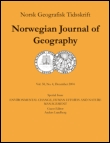
Norsk Geografisk Tidsskrift-Norwegian Journal of Geography
Exploring the intersections of Earth and society.Norsk Geografisk Tidsskrift-Norwegian Journal of Geography, published by Routledge Journals, Taylor & Francis Ltd, is a pivotal peer-reviewed journal that has been instrumental in advancing the field of geography since its inception in 1926. With an esteemed Q2 ranking in both Earth and Planetary Sciences and Geography, Planning and Development categories, it serves as a vital resource for researchers, professionals, and students seeking to deepen their understanding of geographical phenomena. The journal's rich historical archive, covering significant periods in geography and environmental studies, showcases a diverse array of articles that reflect ongoing research trends and challenges within the field. Despite not offering Open Access, its impactful content remains accessible through institutional subscriptions, underscoring the journal's commitment to advancing geographical research and fostering scholarly dialogue. As it continues to publish high-quality research, Norsk Geografisk Tidsskrift stands as a key player in geographical scholarship, reinforcing its importance within the academic community.
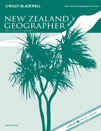
New Zealand Geographer
Advancing Knowledge in New Zealand's Unique LandscapesNew Zealand Geographer, published by WILEY, is a distinguished academic journal that has made significant contributions to the fields of geography, planning, and earth sciences since its inception in 1945. With a dedication to advancing knowledge through rigorous research and critical analysis, the journal encompasses a broad spectrum of topics relevant to both regional and global geographies. This journal is currently indexed in Scopus, achieving commendable rankings in multiple categories, including a Q3 status in both Earth and Planetary Sciences and Geography, Planning and Development for 2023, highlighting its relevance and standing within the academic community. Although it does not currently offer open access, its commitment to providing insightful and impactful content ensures that it remains a vital resource for researchers, professionals, and students alike seeking to deepen their understanding of geographical phenomena. The journal's ongoing publication until 2024 continues to foster scholarly discourse, making it an essential platform for innovative research in geographic studies.
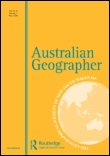
AUSTRALIAN GEOGRAPHER
Exploring the Depths of Geographic ScholarshipAUSTRALIAN GEOGRAPHER, published by Routledge Journals, Taylor & Francis Ltd, is a leading scholarly journal that captures the dynamic and multifaceted field of geography. With an ISSN of 0004-9182 and an E-ISSN of 1465-3311, this peer-reviewed journal has a long-standing tradition, dating back to its origins between 1928 and 1929, and is essential for those engaged in cutting-edge research in Earth-Surface Processes and Geography, Planning and Development. Recognized for its academic rigor, the journal holds a prestigious Q1 ranking in both Earth-Surface Processes and Geography categories as of 2023. Furthermore, its Scopus rankings underscore its influence, placing it in the top 30% of its field. Although it does not currently offer Open Access, AUSTRALIAN GEOGRAPHER remains a critical platform for presenting significant geographic research and fostering academic dialogue, making it indispensable for researchers, professionals, and students eager to contribute to the evolving landscape of geographic scholarship.

Revista Geografica de America Central
Exploring Central America's Geographical Richness.Revista Geografica de America Central is a distinguished scholarly journal published by the UNIV NACL, ESCUELA CIENCIAS GEOGRAFICAS, focusing on the dynamic field of geography, particularly within Central America. Since its inception in 1974, the journal has championed the dissemination of open-access research, fostering collaboration and innovation among researchers, professionals, and students alike. With an evolving scope that reflects the region's rich geographical diversity, this journal serves as a vital platform for sharing empirical studies, theoretical advancements, and methodological discussions that enhance our understanding of Central America's unique environmental and socio-economic challenges. Although it has experienced various coverage periods, the journal remains committed to advancing geographic scholarship and supporting open academic discourse. Its open-access model ensures that essential knowledge is readily available to an expanding global audience, making it an invaluable resource in the field.
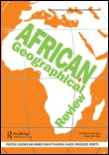
African Geographical Review
Fostering Interdisciplinary Insights for Sustainable DevelopmentAfrican Geographical Review is a pivotal academic journal published by Routledge Journals, Taylor & Francis Ltd, whose mission is to advance knowledge and understanding of geographical dynamics across the African continent. With an ISSN of 1937-6812 and an E-ISSN of 2163-2642, this journal consistently delivers high-quality research, showcasing innovative perspectives and interdisciplinary approaches within the fields of Earth-Surface Processes and Geography, Planning and Development. Recognized in 2023 with a Q2 ranking in these categories, it ranks #231 out of 821 in Social Sciences and #63 out of 179 in Earth and Planetary Sciences according to Scopus metrics, reflecting its substantial impact and relevance. Featuring research that spans various geographic themes, the journal not only champions academic inquiry but also fosters a deeper understanding of spatial and environmental challenges unique to Africa. Engaging with a diverse audience of researchers, professionals, and students, the African Geographical Review serves as an indispensable resource for those committed to enhancing geographic scholarship and informing sustainable development practices across the continent.

Boletin Goiano de Geografia
Exploring the Geographical Tapestry of Brazil and BeyondBoletin Goiano de Geografia is a distinguished academic journal dedicated to the field of Geography, published by the Universidade Federal de Goiás, Instituto de Estudos Socio-Ambientais. Since its inception in 1981, this Open Access journal has provided invaluable insights into the geographical dynamics of Brazil and beyond, promoting scholarly research and dialogue among geographers, environmentalists, and social scientists. The journal seeks to advance knowledge through the dissemination of research articles, reviews, and case studies that address contemporary issues in human and physical geography. With a commitment to fostering interdisciplinary collaboration, Boletin Goiano de Geografia serves as a vital resource for researchers, professionals, and students seeking to explore the complex interactions between society and the environment. Situated in the vibrant academic landscape of Goiana, Brazil, this journal enhances the global discourse on geographical studies and sustainability.

Revista Geografica Venezolana
Advancing Knowledge in Earth-Surface Processes and GeographyRevista Geografica Venezolana is a prominent academic journal published by the Instituto de Geografía y Conservación de Recursos Naturales, Universidad de los Andes, Venezuela. With ISSN 1012-1617 and E-ISSN 2244-8853, it has been a vital platform for scholarly discourse since its inception in 1981, addressing essential topics within the fields of Earth-Surface Processes and Geography, Planning, and Development. Despite its current categorization in Q4 quartiles and lower rankings in Scopus, the journal serves as an important resource for researchers and practitioners, offering insights that contribute to the understanding of geographical and environmental challenges in Latin America and beyond. The journal aspires to foster interdisciplinary dialogue and promote research that tackles pressing societal issues through geographical perspectives. Readers are encouraged to explore its rich content and engage with contemporary research methodologies and findings in the geographical sciences, making it a critical reference for students, researchers, and professionals in the field.

Revista Acta Geografica
Unveiling the Dynamics of Space and EnvironmentRevista Acta Geografica is a prestigious academic journal published by the Universidade Federal de Roraima, specializing in the dynamic field of geography. With the ISSN 1980-5772 and E-ISSN 2177-4307, this journal provides a platform for interdisciplinary research that addresses geographical phenomena, spatial analysis, and environmental concerns primarily relevant to the Brazilian context but also extending to global studies. As an open-access journal, it aims to foster knowledge distribution among researchers, professionals, and students without financial barriers, promoting wider dissemination of scientific outcomes. The journal continues to play a critical role in advancing geographical scholarship, emphasizing both theoretical frameworks and applied methodologies. With a commitment to quality and innovation, Revista Acta Geografica is an essential resource for anyone invested in geographical research and practice.

MITTEILUNGEN DER OSTERREICHISCHEN GEOGRAPHISCHEN GESELLSCHAFT
Elevating Geographic Inquiry and InnovationMITTEILUNGEN DER OSTERREICHISCHEN GEOGRAPHISCHEN GESELLSCHAFT, published by the Österreichische Geographische Gesellschaft, serves as a vital resource within the fields of Geography and Earth-Surface Processes. This journal, with the ISSN 0029-9138, offers a platform for scholarly articles that contribute to the understanding of geographical phenomena, particularly focusing on regional and environmental issues based in Austria since its establishment. Although lacking Open Access options, the journal maintains rigorous publication standards and has seen converged issues from 1978 to 2008, and from 2011 to 2018, alongside recent volumes from 2020 to 2023. As a Q4 ranked journal in the Scopus categories for Geography, Planning and Development, and Earth-Surface Processes, it is strategically positioned to support researchers, professionals, and students striving to enhance geographical knowledge. As such, MITTEILUNGEN DER OSTERREICHISCHEN GEOGRAPHISCHEN GESELLSCHAFT continues to foster geographical discourse and innovation, contributing significantly to the academic community.